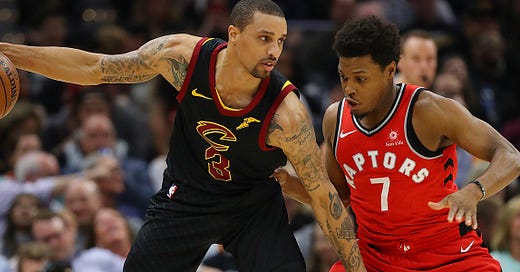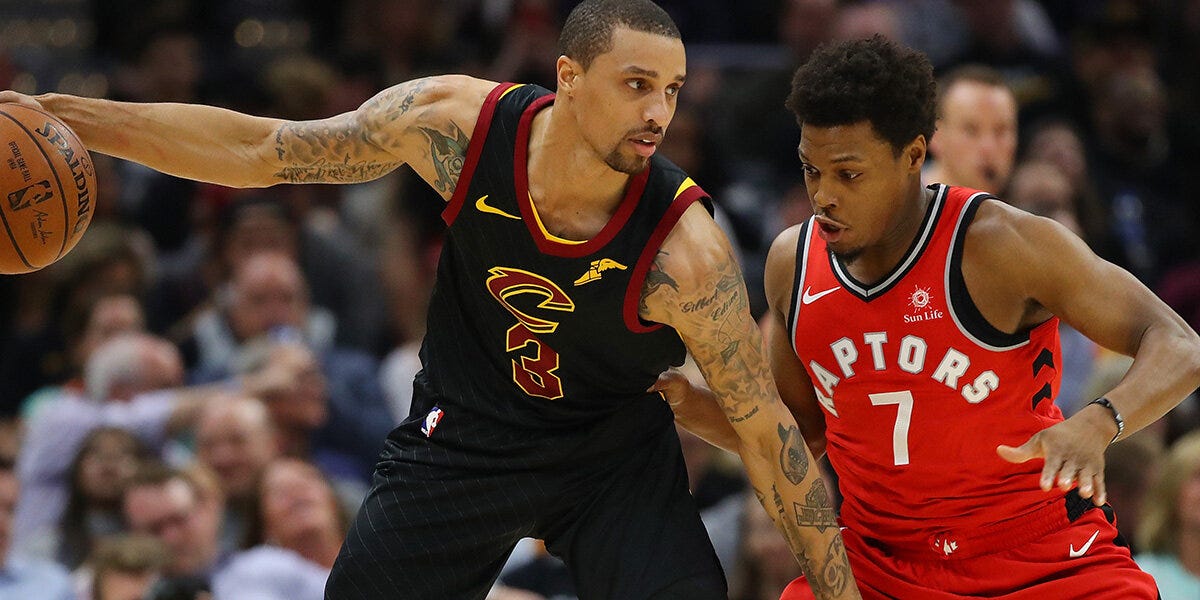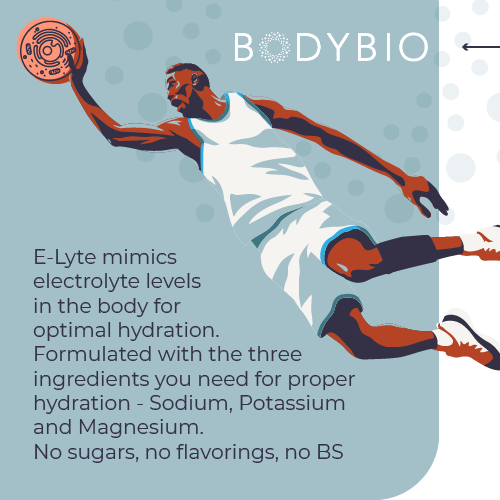Breaking Down The Sixers Trading For George Hill, Not Trading For Kyle Lowry
So how much better did the Sixers get?
Mike O’Connor is the best O’Connor in basketball writing. Previously of The Athletic, you can find Mike on Twitter @MOConnor_NBA. Mike’s writing is brought to you by Body Bio, supplements based on science, focusing on your gut and brain health. Get 20% off E-Lyte and all Body Bio products with promo code RTRS20 at Body Bio’s website.
The trade deadline has come and gone. George Hill is a Sixer. Kyle Lowry remained a Toronto Raptor. A number of teams in the Eastern Conference loaded up, including Miami acquiring Victor Oladipo. It was an eventful day all around the league, but rather than loading up, the Sixers elected to only make one relatively minor move.
Here in this piece, I’ll be breaking down what impact Hill will have on the Sixers, and whether they should’ve gone all-in for Lowry.
All season long, the Sixers’ bench has been plagued by inconsistency across the board. Dwight Howard, Matisse Thybulle, Furkan Korkmaz, and even Shake Milton have all had a wide degree of variance to their performance this season during various stretches, and it’s led to the team not having a concrete idea as to what they’re getting out of their bench on a nightly basis.
George Hill is, in a lot of ways, the opposite of that. Hill has always been a steady, sure-handed, two-way presence who can play next to just about anyone. While Hill doesn’t have the scoring upside of, say, Milton, he immediately becomes one of the team’s most reliable bench players, if not the most reliable.
Hill is 34 and has played just 14 games this season, but his stats have been on-par with the rest of his career. In fact, Hill’s points per 100 possessions this year is the 3rd highest of his entire career. He led the entire league in 3-point percentage last season, and he’s sitting at 38.6 percent this year.
Hill is a player who I have long referenced as an archetype of a guard who fits perfectly with Ben Simmons. He can shoulder some shot creating duties with the ball in his hands, but he’s just as content to sit in the corner and play the role of floor spacer when needed. He’s the quintessential combo guard.
Don’t expect Hill to operate as a score-first player, but he’s a capable pick and roll ball handler who can hit pull-up jumpers with consistency. Hill is a smart cutter and useful passer, as well. In Sixers world, role players who can shoot, dribble, and pass have been hard to come by in recent years, so Hill should be a refreshing upgrade in that sense.
The area where Hill is more of a question mark is the defensive end. He’s been an excellent defender for the majority of his career, but in the limited bit I watched of him in OKC this year, he looked relatively slow and apathetic. That should certainly change once he joins a contending team, but he’s still probably a far cry from the lockdown defender that he once was.
Still, Hill is smart, tough, long, and is a clever off-ball defender. On a per possession basis, his steal numbers are right around where they’ve been for the majority of his career.
Because he’s a better defender than Milton, it’ll be interesting to see if Hill ever gets minutes in closing lineups with the starters. On nights where Danny Green and/or Seth Curry are struggling, Doc Rivers has often opted to play Milton (or occasionally Matisse Thybulle) in those closing lineups. Hill at least provides a two-way presence that Milton and Thybulle can’t quite match.
In general, I’d like to see Rivers use this acquisition as a means of playing some smaller lineups. They could take Mike Scott out of the rotation entirely, play more of Simmons at the four, and go small. Because of his length, Hill can also guard up a position or two in those lineups if needed.
All things considered, I like the acquisition for the Sixers. It’s a bit strange that they had to give up as much as they did -- Boston, for example, got Evan Fournier for two second round picks, whereas the Sixers had to give up three second rounders and a decent young player in exchange for Hill. Nonetheless, this was a solid deal.
Losing Tony Bradley is tough. Bradley had been playing great basketball lately, and there was hope that the Sixers could re-sign him and have him back up Joel Embiid for years to come. That said, Sixers fans may be overestimating his loss just a tad bit. He’s a serviceable backup center at best, and while the Sixers have struggled to find those types of players in years past, Dwight Howard is proof that solid backup center minutes can be found for next to nothing. The Sixers may even have intentions of bringing Howard back next season, which would make Bradley even more superfluous.
Another interesting element to this deal, which perhaps explains the cost: Hill is under contract for next season, partially guaranteed. The Sixers could either pay him $1.27 million to wipe him off the books, or keep him and pay him $10 million. My guess is that the Sixers will hang onto him, partly in an effort to ensure they have tradeable salaries next season. If they keep Hill and re-sign Green to, say, a $10 million deal, those two alone are enough to get you into the conversations for a star trade next year from a salary-matching perspective.
Speaking of star trades, the other noteworthy development from today is that the Sixers, of course, did not acquire Kyle Lowry. As the rumors swirled last week, I wrote that I thought a Lowry trade was not worth the cost, and after the reporting that has come out about the Raptors’ asking price, I feel even more certain of it. Trading Matisse Thybulle, Tyrese Maxey, two first round picks, and Danny Green in exchange for Lowry, as ESPN’s Brian Windhorst reported was the price, would’ve been simply idiotic. No 35-year-old point guard in the history of basketball has ever been worth that type of ransom.
It’s easy to lose sight of it in the allure of trading for Lowry, but Thybulle and Maxey are going to be very good NBA players for a long time. Heck, Thybulle is a good player right now. The Sixers not giving up any of their young talent (sans Tony Bradley) is an overlooked positive from today. Maxey has been buried on the bench for most of the season at this point, but I would not be the least bit surprised to see him make a leap next season and become a staple of the rotation. Punting on three more years of him on a cheap rookie deal would’ve been a killer.
In keeping those two guys as well as all of their first round picks, the Sixers retain their flexibility moving forward in case they want to make a blockbuster trade some time in the next 12 months -- which, again, is also bolstered by having Hill’s salary for next season. I’ve made this point before, but it’s not hard to imagine them making a deal of similar framework to the Jrue Holiday-Bucks trade. Maxey, Milton, Thybulle, salary filler, and a bushel of draft picks gets you into the conversation for the next star player who asks out.
Point being, the Sixers still have enough ammo for one more big trade, and I think that they made the right decision in not blowing the majority of that ammo on a trade for a 35 year old point guard.
I do understand the frustration of any Sixers fan who is disappointed that they didn’t make a bigger splash today. A Lonzo Ball trade would’ve been fun. A Lowry trade would’ve been cause for celebration, even if we all knew it was shortsighted. Nearly six months into the Daryl Morey era, it still doesn’t feel like he’s truly left his mark on the organization. While he did make a run at James Harden, the Sixers still have not made a seismic, franchise-changing move since Morey was brought on.
The good news is, Morey has yet to make a mistake and still very much has the flexibility to make that type of splashy trade in the future. The Sixers are the number one seed in the conference with a ton of young players, and they just added another quality role player at a position of need who is locked up through next season. I wouldn’t say today is any cause for celebration, but it’s a day of marginal improvement nonetheless.







